Description
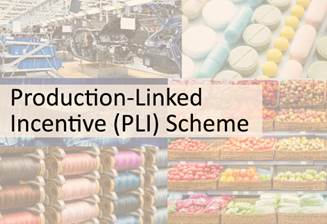
Disclaimer: Copyright infringement not intended.
Context
- The Union Budget 2022-23 has proposed to launch a Scheme for design-led manufacturing as part of the existing PLI Scheme.
- After consultations with stakeholders, the Guidelines for the PLI Scheme for Telecom & Networking Products have been amended to introduce the Design-led Manufacturing with additional incentive rates.
Details
- Department of Telecommunications(DoT) had notified the Production Linked Incentive (PLI) Scheme on 24th February 2021.
- DoT has also approved addition of 11 new telecom and networking products to the existing list, based on suggestions from the stakeholders.
- For promoting design-led manufacturing, Department of Telecommunications (DoT) is inviting applications from Design-led manufacturers as well as others, for availing incentive under the PLI Scheme for five years commencing from 1st April 2022.
- The Scheme is open to both MSME and Non-MSME Companies including Domestic and Global Companies.
- The applications from Design-led manufacturers shall be prioritized over other manufacturers while shortlisting.
- The Design Led Manufacturing is primarily aimed to support efforts for designing telecom products in India. It will recognize and encourage R&D-driven manufacturing in the country to enhance its contribution to global value chain as envisaged in the National Digital Communication Policy, 2018.
- Applicants will have to satisfy the minimum Global Revenue criteria to be eligible under the Scheme. The Company may decide to invest for single or multiple eligible products. The Scheme stipulates a minimum investment threshold of Rs 10 Crores for MSME and Rs 100 Crores for non MSME applicants.
- Land and building cost will not be counted as investment.
- Eligibility shall be further subject to Incremental Sales of Manufactured Goods (covered under Scheme Target Segments) over the base year (FY2019-20). The allocation for MSME has been enhanced from Rs 1000 Crores to Rs 2500 Crores.
Background
- The Union Cabinet had given approval for the PLI Scheme for White Goods for manufacture of components and sub-assemblies of Air Conditioners (ACs) and LED Lights in 2021.
- This was in pursuance of Prime Minister’s clarion call for ‘Atmanirbhar Bharat’ to bring manufacturing at the center stage and emphasize its significance in driving India’s growth and creating jobs.
- The Scheme is to be implemented over a seven-year period, from FY 2021-22 to FY 2028-29 and has an outlay of Rs. 6,238 crore.
What is the PLI Scheme?
- PLI scheme is an initiative that provides incentives to domestic industries to boost local production.
- Through this scheme the Government aims to give companies incentives on incremental sales from products manufactured in domestic units.
- PLI has been introduced to boost domestic manufacturing and cut down on import bills.
|
What is Incremental Sale?
Based on past performance and the projection for future, companies set ‘sales targets’. And then employees are encouraged to make even more than that and whatever has been achieved in excess is called as incremental. So, basically Incremental sales are a concept wherein a company manages to sell more products as compared to its estimates. But to ramp up production in order to sell more products companies usually need to go for self- funding.
In the PLI Scheme however, the Government will provide subsidies/ incentives on this “Incremental Sale” of goods manufactured in domestic units i.e within India.
|
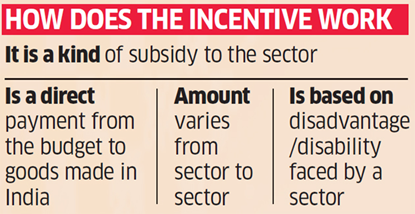
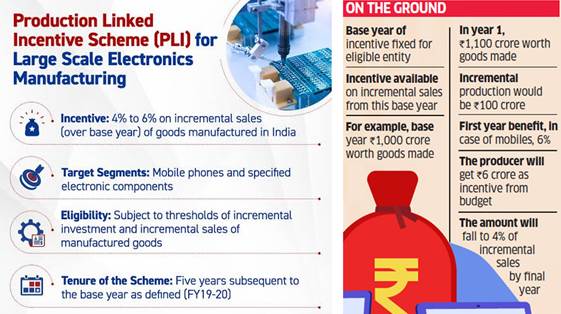
Objectives of the Scheme
- To encourage foreign companies to set up their production activities in India. When this happens, we could see more foreign investments coming into our country.
- To provide support towards the existing domestic companies to expand their manufacturing units.
- To ensure that more employment opportunities are provided to Indian citizens in the manufacturing sector.
Other Sectors under PLI Scheme
2020
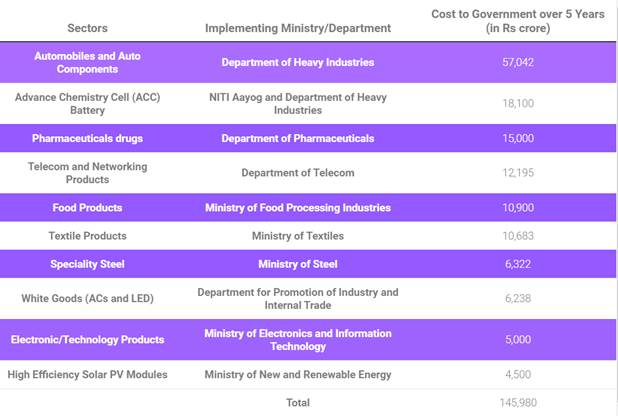
2021
- Drones and Drone Components: Ministry of Civil Aviation
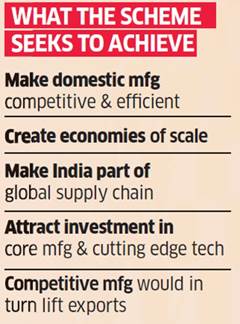
Potential of PLI Scheme
Boost to manufacturing Sector
- A strong, vigorous and dynamic manufacturing sector will fuel India’s economic growth by allowing companies producing in India to penetrate effectively into the global supply chains across various sectors.
Reduce imports
- Apart from enhancing exports, it will also reduce our import dependencies and spur domestic consumption.
Self Reliance
- The call for ‘Atmanirbhar Bharat’ has once again brought manufacturing to the centre stage.
- It has its significance in driving India’s growth and creating jobs in the country at a large scale.
- India offers an attractive domestic market, with a large population in the educated and earning segment.
- It also has a strong institutional framework which allows for a smooth functioning of the industry.
Integration with global market
- A concerted effort towards attracting substantial investments for the creation of large manufacturing facilities, combined with a sharp focus on efficiency and economies of scale, can help Indian companies and manufacturers become globally competitive and integrate with the global markets.
Spillovers
- The scheme will also have beneficial spillover effects by the creation of a widespread supplier base for the anchor units established under the scheme.
- A limited number of eligible anchor entities in each of the selected sectors will invest in technology, plant & machinery, as well as in R&D.
- Along with the anchor unit, these supplier units will also help to generate massive primary and secondary employment opportunities.
Boost to exports
- The current basket of Indian manufacturing constitutes of large volume of low-value products.
- The scheme aims to correct this by encouraging large manufacturers to bring technology and to build capabilities for high value output thereby providing higher returns to the upstream producers.
- It will also enable increase in exports.
Strategic importance
- The scheme envisages a globally-integrated manufacturing in sectors such as automobile and auto components, pharmaceuticals, telecommunications, white goods and steel.
- These are crucial sectors in terms of their strategic importance, contribution to the GDP and employment-generation potential.
- PIL will encourage domestic manufacturers to seize the emerging international opportunities, given the changing geo-political orientation of the world.
Read more here: https://www.iasgyan.in/blogs/the-pli-scheme-all-you-need-to-know
1.png)



















